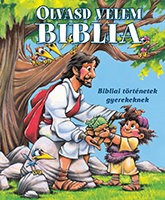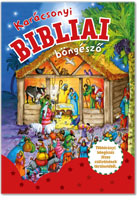János 4:1
Now when it was clear to the Lord that word had come to the ears of the Pharisees that Jesus was making more disciples than John and was giving them baptism
|
János
4:1
When therefore the Lord knew how the Pharisees had heard that Jesus made and baptized more disciples than John,
|
János
4:1
Amint azért megtudta az Úr, hogy a farizeusok meghallották, hogy Jézus több tanítványt szerez és keresztel, mint János,
|
János 4:2
Though, in fact, it was his disciples who gave baptism, not Jesus himself,
|
János
4:2
(Though Jesus himself baptized not, but his disciples,)
|
János
4:2
(Jóllehet Jézus maga nem keresztelt, hanem a tanítványai,)
|
János 4:3
He went out of Judaea into Galilee again.
|
János
4:3
He left Judaea, and departed again into Galilee.
|
János
4:3
Elhagyá Júdeát és elméne ismét Galileába.
|
János 4:4
And it was necessary for him to go through Samaria.
|
János
4:4
And he must needs go through Samaria.
|
János
4:4
Samárián kell vala pedig általmennie.
|
János 4:5
So he came to a town of Samaria which was named Sychar, near to the bit of land which Jacob gave to his son Joseph:
|
János
4:5
Then cometh he to a city of Samaria, which is called Sychar, near to the parcel of ground that Jacob gave to his son Joseph.
|
János
4:5
Megy vala azért Samáriának Sikár nevű városába, annak a teleknek szomszédjába, a melyet Jákób adott vala az ő fiának, Józsefnek.
|
János 4:6
Now Jacob's fountain was there. Jesus, being tired after his journey, was resting by the fountain. It was about the sixth hour.
|
János
4:6
Now Jacob's well was there. Jesus therefore, being wearied with his journey, sat thus on the well: and it was about the sixth hour.
|
János
4:6
Ott vala pedig a Jákób forrása. Jézus azért, az utazástól elfáradva, azonmód leült a forráshoz. Mintegy hat óra vala.
|
János 4:7
A woman of Samaria came to get water, and Jesus said to her, Give me some water.
|
János
4:7
There cometh a woman of Samaria to draw water: Jesus saith unto her, Give me to drink.
|
János
4:7
Jöve egy samáriabeli asszony vizet meríteni; monda néki Jézus: Adj innom!
|
János 4:8
For his disciples had gone to the town to get food.
|
János
4:8
(For his disciples were gone away unto the city to buy meat.)
|
János
4:8
Az ő tanítványai ugyanis elmentek a városba, hogy ennivalót vegyenek.
|
János 4:9
The woman of Samaria said to him, Why do you, a Jew, make a request for water to me, a woman of Samaria? She said this because Jews have nothing to do with the people of Samaria.
|
János
4:9
Then saith the woman of Samaria unto him, How is it that thou, being a Jew, askest drink of me, which am a woman of Samaria? for the Jews have no dealings with the Samaritans.
|
János
4:9
Monda azért néki a samáriai asszony: Hogy kérhetsz inni zsidó létedre én tőlem, a ki samáriai asszony vagyok?! Mert a zsidók nem barátkoznak a samáriaiakkal.
|
János 4:10
In answer Jesus said, If you had knowledge of what God gives freely and who it is who says to you, Give me water, you would make your prayer to him, and he would give you living water.
|
János
4:10
Jesus answered and said unto her, If thou knewest the gift of God, and who it is that saith to thee, Give me to drink; thou wouldest have asked of him, and he would have given thee living water.
|
János
4:10
Felele Jézus és monda néki: Ha ismernéd az Isten ajándékát, és hogy ki az, a ki ezt mondja néked: Adj innom!; te kérted volna őt, és adott volna néked élő vizet.
|
János 4:11
The woman said to him, Sir, you have no vessel and the fountain is deep; from where will you get the living water?
|
János
4:11
The woman saith unto him, Sir, thou hast nothing to draw with, and the well is deep: from whence then hast thou that living water?
|
János
4:11
Monda néki az asszony: Uram, nincs mivel merítened, és a kút mély: hol vennéd tehát az élő vizet?
|
János 4:12
Are you greater than our father Jacob who gave us the fountain and took the water of it himself, with his children and his cattle?
|
János
4:12
Art thou greater than our father Jacob, which gave us the well, and drank thereof himself, and his children, and his cattle?
|
János
4:12
Avagy nagyobb vagy-é te a mi atyánknál, Jákóbnál, a ki nékünk adta ezt a kutat, és ebből ivott ő is, a fiai is és jószága is?
|
János 4:13
Jesus said to her, Everyone who takes this water will be in need of it again:
|
János
4:13
Jesus answered and said unto her, Whosoever drinketh of this water shall thirst again:
|
János
4:13
Felele Jézus és monda néki: Mindaz, a ki ebből a vízből iszik, ismét megszomjúhozik:
|
János 4:14
But whoever takes the water I give him will never be in need of drink again; for the water I give him will become in him a fountain of eternal life.
|
János
4:14
But whosoever drinketh of the water that I shall give him shall never thirst; but the water that I shall give him shall be in him a well of water springing up into everlasting life.
|
János
4:14
Valaki pedig abból a vízből iszik, a melyet én adok néki, soha örökké meg nem szomjúhozik; hanem az a víz, a melyet én adok néki, örök életre buzgó víznek kútfeje lesz ő benne.
|
János 4:15
The woman said to him, Sir, give me this water, so that I may not be in need again of drink and will not have to come all this way for it.
|
János
4:15
The woman saith unto him, Sir, give me this water, that I thirst not, neither come hither to draw.
|
János
4:15
Monda néki az asszony: Uram, add nékem azt a vizet, hogy meg ne szomjúhozzam, és ne jőjjek ide meríteni!
|
János 4:16
Jesus said to her, Go, get your husband and come back here with him.
|
János
4:16
Jesus saith unto her, Go, call thy husband, and come hither.
|
János
4:16
Monda néki Jézus: Menj el, hívd a férjedet, és jőjj ide!
|
János 4:17
In answer, the woman said, I have no husband. Jesus said to her, You have said rightly, I have no husband:
|
János
4:17
The woman answered and said, I have no husband. Jesus said unto her, Thou hast well said, I have no husband:
|
János
4:17
Felele az asszony és monda: Nincs férjem. Monda néki Jézus: Jól mondád, hogy: Nincs férjem;
|
János 4:18
You have had five husbands, and the man you have now is not your husband: that was truly said.
|
János
4:18
For thou hast had five husbands; and he whom thou now hast is not thy husband: in that saidst thou truly.
|
János
4:18
Mert öt férjed volt, és a mostani nem férjed: ezt igazán mondtad.
|
János 4:19
The woman said to him, Sir, I see that you are a prophet.
|
János
4:19
The woman saith unto him, Sir, I perceive that thou art a prophet.
|
János
4:19
Monda néki az asszony: Uram, látom, hogy te próféta vagy.
|
János 4:20
Our fathers gave worship on this mountain, but you Jews say that the right place for worship is in Jerusalem.
|
János
4:20
Our fathers worshipped in this mountain; and ye say, that in Jerusalem is the place where men ought to worship.
|
János
4:20
A mi atyáink ezen a hegyen imádkoztak; és ti azt mondjátok, hogy Jeruzsálemben van az a hely, a hol imádkozni kell.
|
János 4:21
Jesus said to her, Woman, take my word for this; the time is coming when you will not give worship to the Father on this mountain or in Jerusalem.
|
János
4:21
Jesus saith unto her, Woman, believe me, the hour cometh, when ye shall neither in this mountain, nor yet at Jerusalem, worship the Father.
|
János
4:21
Monda néki Jézus: Asszony, hidd el nékem, hogy eljő az óra, a mikor sem nem ezen a hegyen, sem nem Jeruzsálemben imádjátok az Atyát.
|
János 4:22
You give worship, but without knowledge of what you are worshipping: we give worship to what we have knowledge of: for salvation comes from the Jews.
|
János
4:22
Ye worship ye know not what: we know what we worship: for salvation is of the Jews.
|
János
4:22
Ti azt imádjátok, a mit nem ismertek; mi azt imádjuk, amit ismerünk: mert az idvesség a zsidók közül támadt.
|
János 4:23
But the time is coming, and is even now here, when the true worshippers will give worship to the Father in the true way of the spirit, for these are the worshippers desired by the Father.
|
János
4:23
But the hour cometh, and now is, when the true worshippers shall worship the Father in spirit and in truth: for the Father seeketh such to worship him.
|
János
4:23
De eljő az óra, és az most vagyon, amikor az igazi imádók lélekben, és igazságban imádják az Atyát: mert az Atya is ilyeneket keres, az ő imádóiul.
|
János 4:24
God is Spirit: then let his worshippers give him worship in the true way of the spirit.
|
János
4:24
God is a Spirit: and they that worship him must worship him in spirit and in truth.
|
János
4:24
Az Isten lélek: és a kik őt imádják, szükség, hogy lélekben és igazságban imádják.
|
János 4:25
The woman said to him, I am certain that the Messiah, who is named Christ, is coming; when he comes he will make all things clear to us.
|
János
4:25
The woman saith unto him, I know that Messias cometh, which is called Christ: when he is come, he will tell us all things.
|
János
4:25
Monda néki az asszony: Tudom, hogy Messiás jő (a ki Krisztusnak mondatik); mikor az eljő, megjelent nékünk mindent.
|
János 4:26
Jesus said to her, I, who am talking to you, am he.
|
János
4:26
Jesus saith unto her, I that speak unto thee am he.
|
János
4:26
Monda néki Jézus: Én vagyok az, a ki veled beszélek.
|
János 4:27
At that point the disciples came back, and they were surprised to see him talking to a woman; but not one of them said to him, What is your purpose? or, Why are you talking to her?
|
János
4:27
And upon this came his disciples, and marvelled that he talked with the woman: yet no man said, What seekest thou? or, Why talkest thou with her?
|
János
4:27
Eközben megjövének az ő tanítványai; és csodálkozának, hogy asszonnyal beszélt; mindazáltal egyik sem mondá: Mit keresel? vagy: Mit beszélsz vele?
|
János 4:28
Then the woman put down her water-pot and went into the town, and said to the people,
|
János
4:28
The woman then left her waterpot, and went her way into the city, and saith to the men,
|
János
4:28
Ott hagyá azért az asszony a vedrét, és elméne a városba, és monda az embereknek:
|
János 4:29
Come and see a man who has been talking to me of everything I ever did! Is it possible that this is the Christ?
|
János
4:29
Come, see a man, which told me all things that ever I did: is not this the Christ?
|
János
4:29
Jertek, lássatok egy embert, a ki megmonda nékem mindent, a mit cselekedtem. Nem ez-é a Krisztus?
|
János 4:30
So they went out of the town and came to him.
|
János
4:30
Then they went out of the city, and came unto him.
|
János
4:30
Kimenének azért a városból, és hozzá menének.
|
János 4:31
While this was taking place, the disciples were saying to Jesus, Master, take some food.
|
János
4:31
In the mean while his disciples prayed him, saying, Master, eat.
|
János
4:31
Aközben pedig kérék őt a tanítványok, mondván: Mester, egyél!
|
János 4:32
But he said to them, I have food of which you have no knowledge.
|
János
4:32
But he said unto them, I have meat to eat that ye know not of.
|
János
4:32
ő pedig monda nékik: Van nékem eledelem, a mit egyem, a mit ti nem tudtok.
|
János 4:33
So the disciples said one to another, Did anyone give him food?
|
János
4:33
Therefore said the disciples one to another, Hath any man brought him ought to eat?
|
János
4:33
Mondának azért a tanítványok egymásnak: Hozott-é néki valaki enni?
|
János 4:34
Jesus said, My food is to do the pleasure of him who sent me and to make his work complete.
|
János
4:34
Jesus saith unto them, My meat is to do the will of him that sent me, and to finish his work.
|
János
4:34
Monda nékik Jézus: Az én eledelem az, hogy annak akaratját cselekedjem, a ki elküldött engem, és az ő dolgát elvégezzem.
|
János 4:35
You would say, Four months from now is the time of the grain-cutting. Take a look, I say to you, at the fields; they are even now white for cutting.
|
János
4:35
Say not ye, There are yet four months, and then cometh harvest? behold, I say unto you, Lift up your eyes, and look on the fields; for they are white already to harvest.
|
János
4:35
Ti nem azt mondjátok-é, hogy még négy hónap és eljő az aratás? Ímé, mondom néktek: Emeljétek fel szemeiteket, és lássátok meg a tájékokat, hogy már fehérek az aratásra.
|
János 4:36
He who does the cutting now has his reward; he is getting together fruit for eternal life, so that he who did the planting and he who gets in the grain may have joy together.
|
János
4:36
And he that reapeth receiveth wages, and gathereth fruit unto life eternal: that both he that soweth and he that reapeth may rejoice together.
|
János
4:36
És a ki arat, jutalmat nyer, és az örök életre gyümölcsöt gyűjt; hogy mind a vető, mind az arató együtt örvendezzen.
|
János 4:37
In this the saying is a true one, One does the planting, and another gets in the grain.
|
János
4:37
And herein is that saying true, One soweth, and another reapeth.
|
János
4:37
Mert ebben az a mondás igaz, hogy más a vető, más az arató.
|
János 4:38
I sent you to get in grain which you had no hand in planting: other men did that work, and you take the reward.
|
János
4:38
I sent you to reap that whereon ye bestowed no labour: other men laboured, and ye are entered into their labours.
|
János
4:38
Én annak az aratására küldtelek titeket, a mit nem ti munkáltatok; mások munkálták, és ti a mások munkájába állottatok.
|
János 4:39
Now a number of the people of that town had faith in him because of the woman's witness: He has been talking to me of everything I ever did.
|
János
4:39
And many of the Samaritans of that city believed on him for the saying of the woman, which testified, He told me all that ever I did.
|
János
4:39
Abból a városból pedig sokan hivének benne a Samaritánusok közül annak az asszonynak beszédéért, a ki bizonyságot tett vala, hogy: Mindent megmondott nékem, a mit cselekedtem.
|
János 4:40
So when the people came to him they made request to him to be among them for a time, and he was there two days.
|
János
4:40
So when the Samaritans were come unto him, they besought him that he would tarry with them: and he abode there two days.
|
János
4:40
A mint azért oda mentek hozzá a Samaritánusok, kérék őt, hogy maradjon náluk; és ott marada két napig.
|
János 4:41
And a great number more of them came to have faith in him because of what he himself said.
|
János
4:41
And many more believed because of his own word;
|
János
4:41
És sokkal többen hivének a maga beszédéért,
|
János 4:42
And they said to the woman, Now we have faith, but not because of your story: we ourselves have given ear to his words, and we are certain that he is truly the Saviour of the world.
|
János
4:42
And said unto the woman, Now we believe, not because of thy saying: for we have heard him ourselves, and know that this is indeed the Christ, the Saviour of the world.
|
János
4:42
És azt mondják vala az asszonynak, hogy: Nem a te beszédedért hiszünk immár: mert magunk hallottuk, és tudjuk, hogy bizonnyal ez a világ idvezítője, a Krisztus.
|
János 4:43
And after the two days he went on from there into Galilee.
|
János
4:43
Now after two days he departed thence, and went into Galilee.
|
János
4:43
Két nap mulva pedig kiméne onnét, és elméne Galileába.
|
János 4:44
For Jesus himself said that a prophet has no honour in the country of his birth.
|
János
4:44
For Jesus himself testified, that a prophet hath no honour in his own country.
|
János
4:44
Mert Jézus maga tett bizonyságot arról, hogy a prófétának nincs tisztessége a maga hazájában.
|
János 4:45
So when he came into Galilee, the Galilaeans took him to their hearts because of the things which they had seen him do in Jerusalem at the feast--they themselves having been there at the feast.
|
János
4:45
Then when he was come into Galilee, the Galilaeans received him, having seen all the things that he did at Jerusalem at the feast: for they also went unto the feast.
|
János
4:45
Mikor azért beméne Galileába, befogadták őt a Galileabeliek, mivelhogy látták vala mindazt, a mit Jeruzsálemben cselekedett az ünnepen; mert ők is elmentek vala az ünnepre.
|
János 4:46
So he came to Cana in Galilee, where he had made the water wine. And there was a certain man of high position whose son was ill at Capernaum.
|
János
4:46
So Jesus came again into Cana of Galilee, where he made the water wine. And there was a certain nobleman, whose son was sick at Capernaum.
|
János
4:46
Ismét a galileai Kánába méne azért Jézus, a hol a vizet borrá változtatta. És volt Kapernaumban egy királyi ember, a kinek a fia beteg vala.
|
János 4:47
When it came to his ears that Jesus had come from Judaea into Galilee, he went to him and made a request that he would come down to his son, who was near to death, and make him well.
|
János
4:47
When he heard that Jesus was come out of Judaea into Galilee, he went unto him, and besought him that he would come down, and heal his son: for he was at the point of death.
|
János
4:47
Mikor ez meghallá, hogy Jézus Júdeából Galileába érkezett, hozzá méne és kéré őt, hogy menjen el és gyógyítsa meg az ő fiát; mert halálán vala.
|
János 4:48
Then Jesus said to him, You will not have faith if you do not see signs and wonders.
|
János
4:48
Then said Jesus unto him, Except ye see signs and wonders, ye will not believe.
|
János
4:48
Monda azért néki Jézus: Ha jeleket és csodákat nem láttok, nem hisztek.
|
János 4:49
The man said, Sir, come down before my boy is dead.
|
János
4:49
The nobleman saith unto him, Sir, come down ere my child die.
|
János
4:49
Monda néki a királyi ember: Uram, jőjj, mielőtt a gyermekem meghal.
|
János 4:50
And Jesus said, Go in peace; your son is living. The man had faith in the word which Jesus said to him and went away.
|
János
4:50
Jesus saith unto him, Go thy way; thy son liveth. And the man believed the word that Jesus had spoken unto him, and he went his way.
|
János
4:50
Monda néki Jézus: Menj el, a te fiad él. És hitt az ember a szónak, a mit Jézus mondott néki, és elment.
|
János 4:51
And while he was going down, his servants came to him and said, Your boy is living.
|
János
4:51
And as he was now going down, his servants met him, and told him, saying, Thy son liveth.
|
János
4:51
A mint pedig már megy vala, elébe jövének az ő szolgái, és hírt hozának néki, mondván, hogy: A te fiad él.
|
János 4:52
So he put a question to them as to the hour when he became better; and they said to him, The disease went from him yesterday at the seventh hour.
|
János
4:52
Then enquired he of them the hour when he began to amend. And they said unto him, Yesterday at the seventh hour the fever left him.
|
János
4:52
Megtudakozá azért tőlük az órát, a melyben megkönnyebbedett vala; és mondának néki: Tegnap hét órakor hagyta el őt a láz;
|
János 4:53
It was clear then to the father that this was the very time at which Jesus said to him, Your son is living. And he had faith in Jesus, he and all his family.
|
János
4:53
So the father knew that it was at the same hour, in the which Jesus said unto him, Thy son liveth: and himself believed, and his whole house.
|
János
4:53
Megérté azért az atya, hogy abban az órában, amelyben azt mondá néki a Jézus, hogy: a te fiad él. És hitt ő, és az ő egész háza népe.
|
János 4:54
Now this is the second sign which Jesus did after he had come out of Judaea into Galilee.
|
János
4:54
This is again the second miracle that Jesus did, when he was come out of Judaea into Galilee.
|
János
4:54
Ezt ismét második jel gyanánt tevé Jézus, mikor Júdeából Galileába ment.
|






